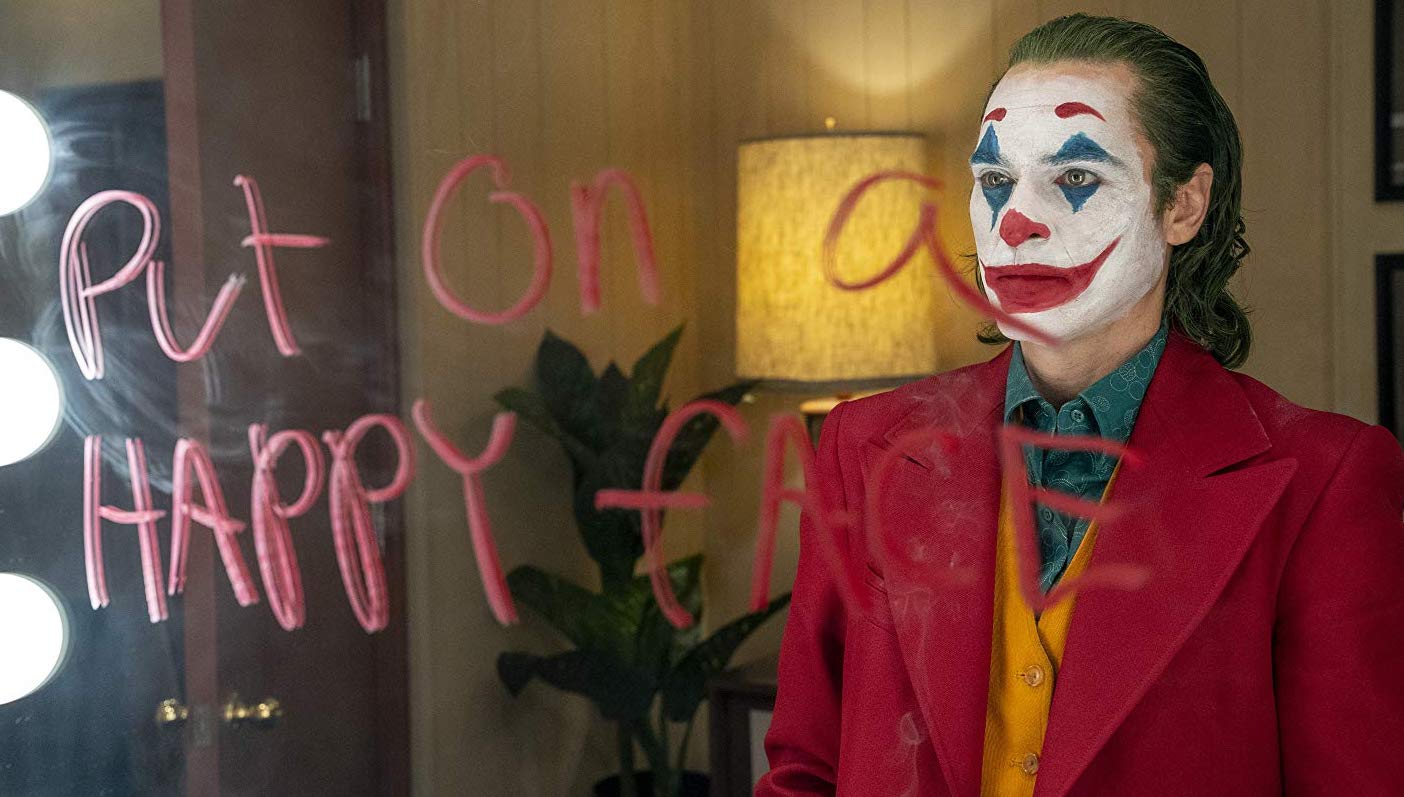At the center of this Scorsese pastiche lands Arthur Fleck (Joaquin Phoenix), a clown-for-hire by day and a wannabe stand-up comedian by night. He’s also recently been discharged from a mental hospital and lives with his mother Penny (Frances Conroy). Arthur is squeaking by, but he’s also optimistic about his chances, though there’s a vast distance between his nonexistent skills and his likelihood for success. After being robbed by a young gang of teenagers, a coworker insists that Arthur arm himself and subsequently ignites a series of events that will lead to the cops looking for him and the city further drowning in a sea of austerity and discontent and class warfare.
With Arthur at one end of the economic spectrum, figures like Thomas Wayne (Brett Cullen) and Murray Franklin (Robert de Niro) are his polar opposites. Wayne is a fantastically wealthy industrialist running for mayor, and, per Penny’s insistence, is also Arthur’s father following a tryst between him and Penny when she worked for his corporation. Wayne’s campaign for mayor is openly antagonistic towards the average person in the city, insisting that anyone who has a beef with the 1% is just jealous and grabby. Sharing in his disdain is Franklin, a popular late night TV talk show host that Arthur loves and aspires towards, at least until Franklin airs a recording of Arthur’s dreadful, sweaty stand-up routine. Both of these well-placed members of elite society serve as targets for Arthur’s growing alienation and frustration, as well as a further rip-off of Scorsese, this time with The King of Comedy serving as a ready-made template for Phillips to pull from.
It’s not like directors don’t steal and borrow from each other all the time. I love many of the films of Quentin Tarantino and Paul Thomas Anderson, both famous imitators of cinema’s past. What irks so much with Phillips and Joker is how empty the result of all that borrowing is. The film is void of subtext and is as subtle as a Harley Quinn mallet to the face. The opening shot of Joker is Arthur applying his makeup, painting over the tears that are streaking it and using his fingers to force himself to smile in the mirror. Whoever heard of a sad clown? That’s the level that Phillips is operating on. From there, the film refuses to take any real risks. Arthur’s growing penchant for violence is directed at people who are mean to him, thus giving him the patina of the anti-hero and the audience a place to hide. His behavior is pathetic instead of creepy, even as he imagines a relationship between himself and neighbor Sophie (Zazie Beetz) and the film thinks to include an unexamined glimpse into his inner sex life. This reticence to push any kind of envelope reeks of the film’s hybrid nature as both adult drama and comic source material aimed at global audiences. It can only be so weird i.e. not weird at all.
Ultimately, the film demonstrates where its sympathies lie in how it exaggerates bad behavior past the point of any acceptable reality. De Niro’s Franklin is the epitome of this, especially considering the film climaxes with he and Arthur coming into contact. Arthur’s stand-up act is self-congratulatory anti-comedy and obviously the performance of an unwell man, but the film insists that not only does Franklin have a team filming at ill-attended open mic nights, that he’ll turn over control of his show to those comics who perform the worst. Phillips and co-writer Scott Silver contrive scenarios so outlandish that they break their own film, unless they do so to create post-modern outs of what is and isn’t real. Arthur is shown to be delusional and an unreliable narrator, so the film’s partisans can gleefully discount any cheap turns the film takes as baked-in easter eggs for those that really ‘get’ Joker, as if there’s anything to get when a movie has the opening shot that this one does.
Working as hard as he can to complicate what is otherwise a thin film is Phoenix, an actor who doesn’t always go big, but can go as big as the best of them. Physically, he’s in Freddie Quell territory, all ribs and shoulder blades and bad posture. Emotionally, he’s not as erratic and unpredictable as Quell, but there is a shared sense of conscious repression. Arthur has a tic where he bursts into fits of laughter (of course he does), and seeing Phoenix convey the frustration and futile effort in suppressing it is impressive. His physicality is as big and broad as it can be, personified by an overwrought scene on the now-famous Joker Steps where he high-steps and kicks to Gary Glitter. This scene in particular feels like weirdness for weirdness’ sake, but it’s a rough imitation of how Franklin kicks his show off and more evidence of Arthur’s complete lack of imagination or originality. For Arthur, and through Phoenix’s smug portrayal of this insular moment of triumph, imitation is the best idea he can dream up, and the viewer recognizes that he’s in the right film.
Because Phillips can’t help himself, and perhaps because this is how he thinks one wins Oscars, Joker has to have some kind of social relevance. The public services that propped up Arthur’s life, be it subsidized psychiatric meds or garbage collection, are deprived of him until he finally snaps against a life lived without care or comfort. This is such a bleak, pessimistic, and again, unimaginative view of humanity that could only come from someone as wealthy as Phillips. The less fortunate aren’t worthy of care because they’re humans with inherent value and dignity, but because they’re dangerous and need to be made compliant lest they kill us in our beds. Patronize their impossible aspirations of stand-up comedy, or everything will crumble around you. Let that be a lesson for moviegoers, beyond the obvious one that is ‘watch more Scorsese movies.’ C-

 RSS Feed
RSS Feed